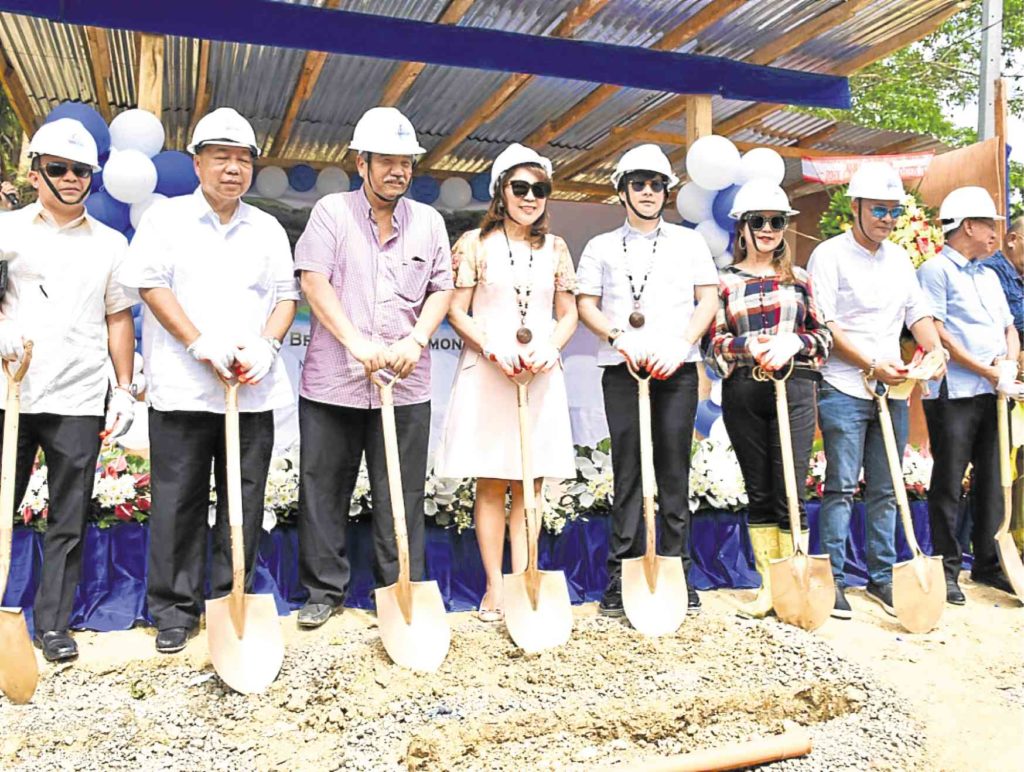Salt king working miracles in Bohol waters

Davao City Water District chair Eduardo Bangayan (second from left), Richli Corp. chair Richard E. Lim, Tourism Secretary Wanda Teo, Office of the Presidential Assistant for the Visayas Secretary Michael Diño, and local government officials lead the groundbreaking ceremony of the P1.5-billion water treatment facility in Panglao, Cortes.
Richard E. Lim evolved from a young freight clerk for a shipping line to becoming the founder and CEO of one the country’s largest salt traders and distributors because his fertile mind saw a basic need that urgently had to be met.
Lim marshaled his time, money and effort to fill that requirement for top quality and affordable salt, thus laying down the foundation for a group of companies that is widening its reach and influence, primarily in the Visayas.
At 60 years old, the intrepid Lim and his wife and partner, Phoebe, can now very well afford to just sit back and relax, confident in the knowledge that their sons—Ralph, Richard Jr., Redmond and Rex—are more than capable of handling the different units of the growing Lim group.
These include Artemis Salt Corp., which is into wholesale salt trading and distribution; Starport Trading Corp., Tacloban Solid Cement Corp and Starport Bohol Cement Corp., the leading cement distributors in the Visayas; and the upscale and luxurious Eskaya Beach Resort and Spa in Panglao, Bohol, the crown jewel of the property development arm.
But like that time in the late 1970s when he got the idea to venture into salt because he saw how many sacks of salt were being delivered every day aboard ships, Lim sees today yet another opportunity to not just make money, but more importantly, make a difference.
And that is through the provision of basic water services to his beloved home province of Bohol, which has been attracting droves of tourists but has remained constrained by the lack of steady access to clean and affordable water.
Under Richli Corp., the group will invest some P1.5 billion in the distribution of bulk potable water to key areas of Bohol, including the tourist destination of Panglao, just southwest of Tagbilaran, where majority of visitors go.
Lim, chair and CEO of Richli, knows full well the woes of having no access to potable water due to challenges in running the luxury Eskaya resort.
“We started planning the water project as early as 2011 because of our problem with water. Because of the quality of the water from the deep wells, our linens became yellowish. And what’s more, it was expensive, with water selling for about P200 a cubic meter now, compared to just P30 to P40 a cubic meter in Metro Manila. As a Boholano, I wanted to help,” says Lim.
The company took the first step into turning that vision of having clean and affordable water available in Bohol into reality with the groundbreaking last month of a state-of-the-art water treatment facility in Cortes, 32 kilometers northwest of Panglao.
Once fully operational by August this year, the water treatment plant of Richli will be able to produce an initial 10,000 cubic meters of clean water every day, eventually reaching a peak output of 25,000 cubic meters a day.
There will be 32 kilometers of distribution pipelines that will reach Dauis, the capital of Tabilaran, and Panglao, benefiting as many as 15,000 households.
The estimate is that the water that will be piped directly into the households will cost about P100 a month for five cubic meters of water.
Lim adds the plan is to implement a socialized pricing model for water distribution to benefit as many Boholanos as possible, including the burgeoning tourism sector.
The Lim family knows the value of sustainable supply of water in fostering and encouraging tourism in Bohol.
In a separate statement, Ralph Lim, president and COO of Eskaya, says: “As a region whose economy relies heavily on tourism, an abundant and stable source of safe potable water is invaluable not just for the locals, but for our guests as well. It not only allows us to better serve our guests, but it also fosters further development and investment in the region, like the soon-to-open Panglao Airport.”
The project, the first of its kind in Bohol, has won support from both local and regional government officials. The groundbreaking was attended by Michael Dino, Presidential Assistant for the Visayas; Wanda Teo, Tourism Secretary; and Edgar Chatto, Governor of Bohol.
There were actually other companies that had explored the idea of investment in water distribution in the Panglao area considering the growing tourism infrastructure, which is expected to further expand with the operation of the international airport.
These turned out to be empty promises. And their loss promises to be Lim’s gain, and ultimately the gain of the province Lim calls home.
“We are from Bohol and we want to give back,” says Lim.
